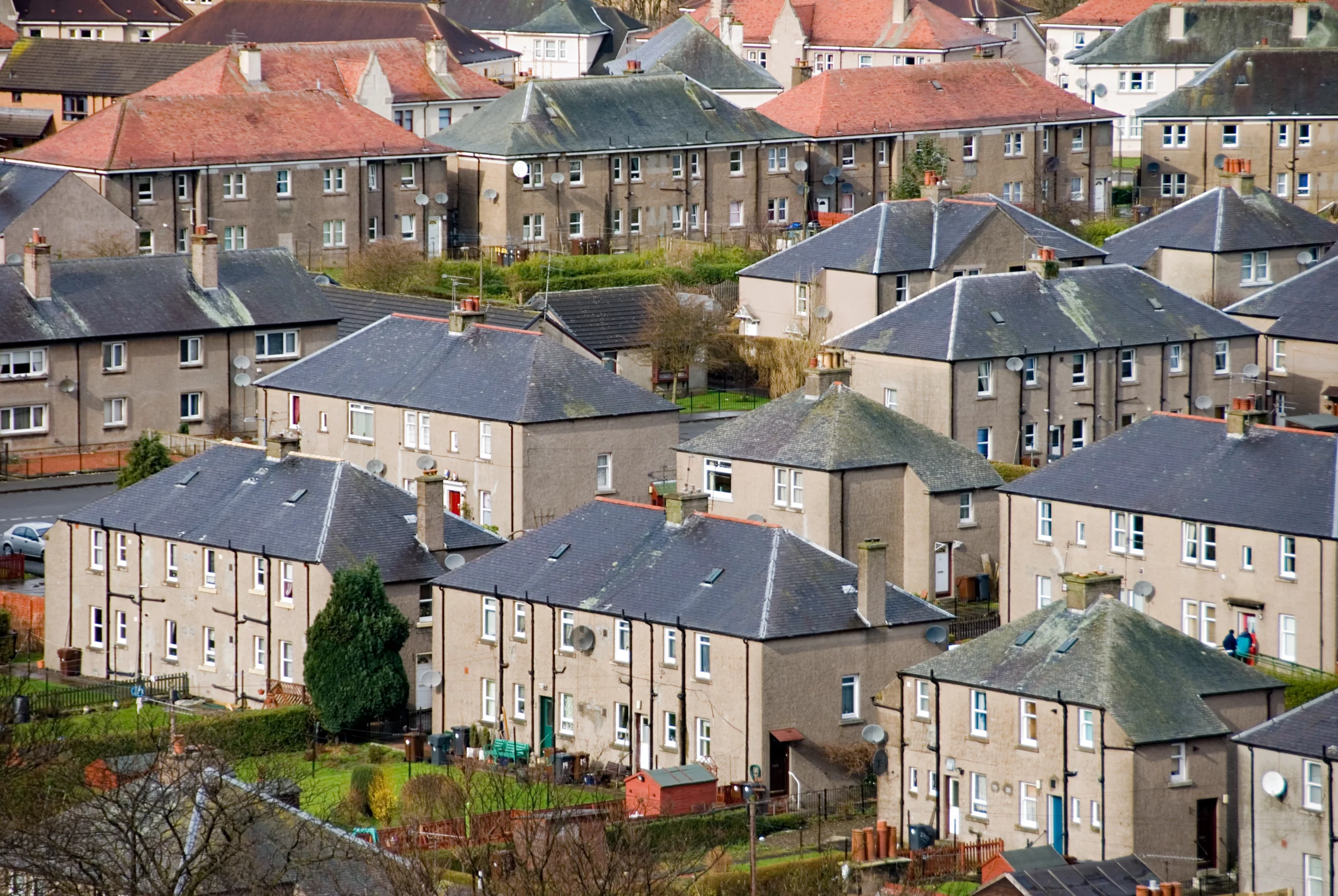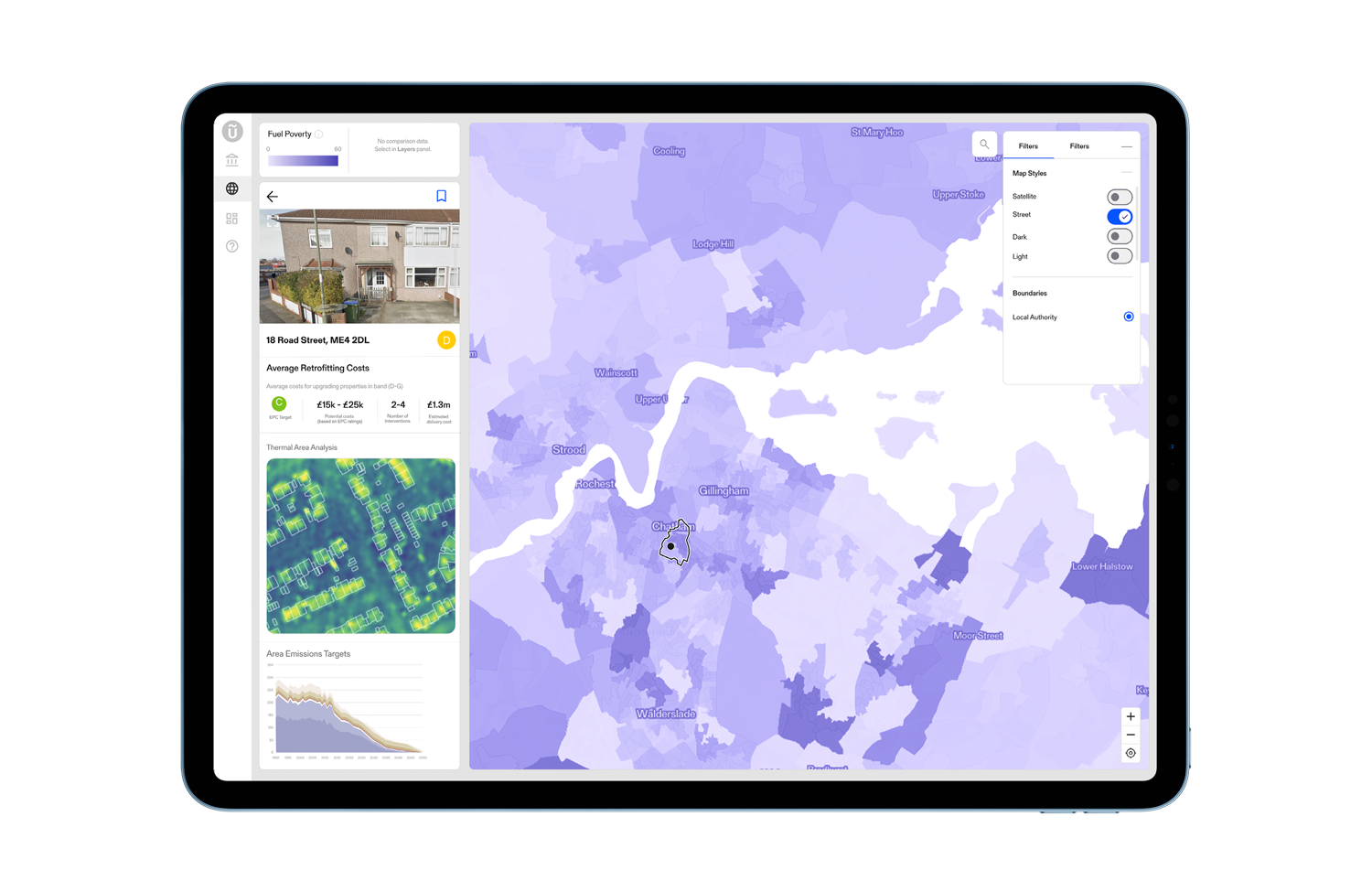****
No
Home
Left
Cold
****
Exploring how we can use the power of Data and AI to make some of the most vulnerable homes in the UK warmer, more comfortable and carbon efficient.
AI Development & Programme Delivery UrbanTide
Design, Development & Storytelling Friendhood Studio
Planet-Centred Design Zoë Prosser
Energy Markets Expertise Lyndsay Thomson
A project developed and delivered by UrbanTide’s uEco Team with funding from Innovate UK Design Foundations
A world without fuel poverty
What tools and approaches are needed to create it?
How would this affect our daily lives, our communities' health, and our planet's resilience?

A problem at scale
31 million people in Great Britain live in poorly insulated properties. This means higher energy bills, cold and draughty conditions, health issues and unnecessary emissions. In Great Britain alone, 31% of greenhouse gases are caused by domestic heating systems.
In a world that is hurtling towards its planetary limits with increasingly unstable energy supplies, it’s imperative that every household becomes more energy efficient through infrastructural changes and low-carbon energy sources. It’s even more important that we do so in a way that doesn’t leave vulnerable households behind.
“Providing support for low income households to switch to low carbon heating is an important part of a just transition towards Net Zero – ensuring that the poorest in society not only are not left behind but can be some of the earliest beneficiaries.”
Fuel Poverty Strategy England
Sustainable Warmth:
Protecting Vulnerable Households in England
UK Gov, 2021
The UK Government’s targets reflect this ambition for a Just Transition to ensure that no one is excluded in the move to a net zero economy (UK Net Zero Strategy, 2021). Doing this inclusively requires targeted energy-efficiency support for people and their homes; however, identifying who receives those interventions and in what form remains challenging.
“Goals to end fuel poverty and reach Net Zero carbon emissions are deeply intertwined. We cannot eliminate our carbon emissions without upgrading the least efficient homes.”
NEA and EAS UK Fuel Poverty Monitor
2021

The scale of the problem is huge and the intersections are complex
The housing infrastructure that we live in, in parallel with the economic, social and planetary constraints that we’re living through, present a complicated picture. In the UK, 60% of homes need to be more energy efficient (EPC rating of C or above). Domestic energy bills have overtaken council tax as the biggest driver of household debt, with recent estimates indicating £3.6bn of UK energy debt.
6.7m
Households in fuel poverty and not registered for certain benefits
At the same time, evidence shows us that people are simply not accessing the help they need. It’s estimated that 6.7m households in fuel poverty are not registered for certain benefits, and only 1 in 3 consumers are aware of the Priority Services Register. Support is available with a current budget of over £2.55bn per year allocated to improving energy efficiency and assisting householders to pay their fuel bills. But only about £0.4bn per annum is received by fuel-poor households (Committee on Fuel Poverty - GOV.UK: Report).
It is clear that reductions in household energy debt and carbon emissions are challenging priority areas, and innovation in this space requires tackling fuel poverty and planet-centred challenges together through data-driven decision making.
****
Unlocking
the power
of AI
****
Working at the intersection of fuel poverty alleviation, climate change adaptation and emerging technologies, we embarked on our collaboration. We set out to understand the challenges and opportunities around identifying vulnerable customers to ensure they receive the most relevant targeted support.
In turn, we used these insights to develop AI tools that drive organisations to effectively support their most vulnerable, fuel poor customers, and unlock sustainable development in an ever-changing world.
Taking a planet-centred approach
Planet centred design is an approach that balances the needs of the planet and its people through principles of sustainability, equity and resilience (Design Council, 2021). In this project, it was used to acknowledge the complexity of interconnected systems and the medium to long-term effects of our often short-term decision making.
This allowed our team to balance the immediate economic and social constraints associated with managing fuel poverty against environmental net zero targets and sustainable development goals.
Why AI?
AI is valuable for tackling complex problems because it can process large datasets, recognise intricate patterns, and handle nonlinear relationships. By harnessing it alongside a planet-centred design approach, we can help address the challenge of reducing fuel poverty through targeted housing interventions.
Approach
uEco in numbers
Throughout this project, we worked in collaboration with Energy Suppliers, Energy Networks, Local Authorities and Net Zero Hubs to get a broad spectrum of insights.
14
Exploring the Energy and Networks Sectors
Engaged 14 organisations across the industry
30
Understanding the opportunities
Seven sessions with over 30 attendees across industries
1200
Discovering solutions and plotting a way forward
1200+ insights distilled into four focus areas for development
1
Building the right thing
New product development that can help identify millions of homes that need support
Personas
An equitable and realistic transition to Net Zero requires a deeper understanding of households and the challenges they face on their journeys to warmer, more comfortable homes.
Focus for this project
Not in scope
Insights
While the UK’s energy sector prioritises debt reduction for the most vulnerable, how we accurately define, identify and respond to these vulnerabilities is crucial to support those most in need whilst enabling access to net zero transitions.
Increasingly, the complexity of vulnerabilities in relation to fuel poverty is deepening and expanding. Due to the challenges of the pandemic and the cost of living crisis in the UK, new demographics of households are falling into debt and yet are often not eligible for certain grants and schemes.
Energy suppliers and networks have a difficult job to do. With levels of energy debt in the UK reaching £3.6bn and the complexity of vulnerable customers rising, more effective strategic decision-making is required to offer appropriate interventions at the right times.
In response, we set out to help those making the decisions get the most accurate picture of their customers’ changing needs, identify new sets of customer groups at risk of falling into debt and fuel poverty, and make better informed decisions about which interventions to offer in line with net-zero targets.
4 stages
For energy networks and suppliers, the process of making energy efficiency interventions requires more detailed intelligence. We identified four stages in this process to help inform decision making.
01 — Accurate Identification
How can we understand customer needs and eligibility for targeted support to accurately identify and assist households?
- Understand the building fabric of properties and those living within it at a granular household level.
- Enable preventative action and interventions by using data to predict trends.
- Match people to the correct support schemes.
- Manage customer data, ensuring it’s updated as circumstances change.
- Identify who is most at risk of “being left behind” within the Just Transition to net zero. For example those at risk who are not eligible for support or those who are eligible but struggle to engage.
- Review scheme options and identify the most impactful solution from a carbon reduction perspective. For example by comparing solutions that deliver more carbon reduction long-term vs short-term benefits at a lower cost for delivery.
02 — Partner Evaluation
How can we effectively manage and better utilise partnerships that deliver fuel poverty and vulnerability solutions?
- Help organisations analyse their partner networks and identify gaps and overlap between offerings.
- Create a data driven operating model which aligns partners to needs and highlights partners who can offer multiple support services.
- Identify gaps in partnerships so that we can be better at delivering on sustainability targets and strategies.
- Look at partners geographically and make decisions to reduce supply chain logistics and carbon usage overall.
- Select partners and suppliers with the most sustainable practices and supply chains.
03 — Effective Interventions
How can we deliver impactful interventions while managing obligations, targets, and multiple schemes effectively?
- Provide a better view of intervention effectiveness in order to optimise activities and budgets.
- Influence the allocation of funding and budget to the most appropriate scheme for maximum return for households and organisations.
- Identify areas and groups that would benefit from targeted net zero guidance. This is particularly important for those who are vulnerable but not “eligible”.
- Identify when one intervention (or a past intervention) would limit eligibility for more Eco options.
- Lower internal investment and carbon costs needed to survey areas/homes to identify potential gains
04 — Measuring Impact
How can we balance detailed reporting and help influence industry action effectively?
- Provide a multi-faceted view of impacts delivered.
- Enable data-driven approaches to identification and intervention.
- Utilise insight and impact analysis to support suppliers and networks to influence and drive industry improvement.
- Quantify the relationship between debt reduction and emission reductions, which enables reporting against Just Transition policy targets.
- Report on how much funding has been spent from each scheme and how that’s been converted into carbon reductions.
- Use insights about carbon savings related to interventions to drive effective sustainability strategies.
- Feed data-driven insights into sector wide improvements and potential regulatory change.
Creating a product
We transformed these insights into new product features for uZero: our powerful AI and data insights platform that maps, identifies and predicts fuel poverty.

Key Features
Hidden
Households
uZero makes it easier to identify areas in or at risk of falling into fuel poverty. This includes “hidden pockets” of households in fuel poverty and higher debt risk that would otherwise escape detection.
Heatmap
Analysis
View local data through a securely hosted data dashboard. uZero presents the probability results in an easy-view heatmap to help organisations identify areas at high risk of fuel poverty.
Fuel Poverty
Risk Score
uZero provides unique data intelligence by integrating anonymised smart meter system data with multiple cross-sector datasets to indicate areas with the highest fuel poverty risk based on several key indicators.
Insights into action
We are building a solution that aims to create warmer, more comfortable homes for communities while substantially reducing household CO2 emissions. By creating an adaptive and innovative tool, we strive to unlock sustainable development in partnership with the energy sector, net zero and just transition strategic guidelines.
A framework for strategic sustainable development
The potential is immense
By building a tool that effectively and efficiently identifies vulnerable customers we can help organisations deliver targeted, streamlined solutions that have an impact for years to come.
Our impact ambitions align with the UN sustainable development goals, and with successful implementation, we are striving to help positively influence:
01— No poverty
02— Zero hunger
03 — Good health and wellbeing
07— Affordable and clean energy
12— Responsible
consumption and production
10— Reduced inequality
11— Sustainable cities and communities
08— Decent work and economic growth
09— Industry, innovation
infrastructure
17— Partnerships for the goals
****
A better
world is
possible
****
We already have much of the technological and intellectual firepower to tackle our sustainability challenges.
We’re at the start of our journey, and we recognise that the solution to more comfortable lives and a successful Just Transition doesn’t rely on one product alone; it requires a dynamic systems approach and involvement at every level.
“It can be overwhelming to witness/experience/ take in all the injustices of the moment; the good news is that they are all connected. So if your work involves pulling at one of the threads your helping to unravel the whole cloth”
Ursula Wolf-Rocha
By consistently evolving our approach to data and committing to innovation, we can continue to influence how people adapt their lives for the better and be at the forefront of making a sustainable world with data and AI.
Interested in finding out more about the uEco project and our uZero product or how to get involved with the conversation — please get in touch.
Start your journey
Take a look at our product page to find out which UrbanTide AI tool has been designed for your needs.
See uSmart and our growing AI portfolio in action and find our how we can support your data and AI programmes
